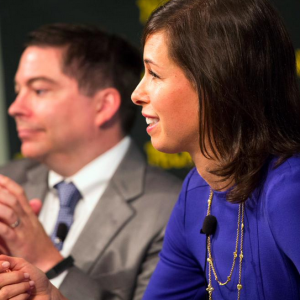A Democrat on the Federal Communications Commission raised questions Thursday about actions the agency has taken under its Republican leadership to facilitate the $3.9 Sinclair-Tribune merger of the nation’s two largest TV broadcasters.
Commissioner Jessica Rosenworcel says she has serious concerns about the transaction that would see Sinclair Broadcast Group, with its reputation for disseminating hard-right news packages to local stations across the U.S., take control of Tribune Media. The merger would let Sinclair control over 130 stations affiliated with the four biggest broadcast networks in the U.S. — ABC, CBS, NBC and Fox. The stations stretch across more than 100 markets, including 40 of the top 50 in places like New York, Los Angeles, and Chicago, and political battleground states such as North Carolina, Ohio, and Pennsylvania.
“I am concerned the commission is gearing up to approve a transaction that will hand a single broadcast company the unprecedented ability to reach more than 70 percent of American households,” Rosenworcel told the U.S. Conference of Catholic Bishops in Washington Thursday. “It hasn’t happened yet. But there are disconcerting signs.”
According to Rosenworcel those signs include FCC Chairman Ajit Pai’s decision to resurrect the ultra-high frequency (UHF) discount — an FCC loophole in Congress’s national broadcasting cap limiting any one company from reaching more than 39 percent of the national audience. The discount allows broadcasters to count only 50 percent of the audience reached by stations broadcasting in UHF, a format considered weak and unreliable when the discount was enacted in the 1980s. The evolution of digital TV technology has eliminated the technological difference, and the Obama administration closed the loophole last year.
Sinclair, the largest owner of broadcast stations in the country, hovered near the cap when rumors swirled in March it may buy Tribune, the second-largest broadcaster. The FCC reinstated the UHF discount a month later, lowering Sinclair’s audience reach on paper to 24 percent and setting the stage for it to buy Tribune. Two weeks later the deal was announced, and if approved, will take Sinclair from 173 stations to 215 and allow it to reach 72 percent of American households.
“Before I returned to the Commission, the agency inexplicably resurrected an outdated and scientifically inaccurate system for tallying station ownership, known as the UHF discount,” Rosenworcel said. “It also reversed an effort to investigate joint sales agreements. Both steps helped speed the way for this transaction—which would combine two broadcasting giants: Tribune and Sinclair.”
Democrats aren’t the only ones concerned about the deal. Numerous conservative media outlets have expressed skepticism, including Newsmax CEO Chris Ruddy, who met with Rosenworcel Wednesday to discuss Pai’s effort to get rid of a rule that requires TV and radio stations to operate studios in or near the communities they broadcast in, according to Politico. Former FCC Chairman Tom Wheeler warned the rule would be a giveaway to Sinclair.
“I’m not alone in my concerns about the concentration that will result from this proposed transaction,” Rosenworcel said. “I’m not alone in my fear that it will do harm to the time-tested principles of diversity, localism, and competition. There is opposition across the political spectrum.”
The Democratic commissioner said she couldn’t “put it better than the Newsmax Group, which has warned that ‘a free and diverse press, a bedrock principle of American democracy,’ will be irreparably harmed by this merger.”
Even Pai, who Democrats accuse of bending over backwards to clear regulations for the merger, is growing frustrated with Sinclair’s boldness, according to RedState. The conservative news website reports a “media executive, one of a raft of right-wing media moguls who opposes the merger, says Sinclair Broadcasting has irked Pai and the FCC by treating it as a done deal, and displaying a ‘cocky’ attitude.”
The FCC chief was reportedly dissatisfied after the agency asked Sinclair for more information about how it would comply with FCC rules that forbid broadcasters from owning more than one of the top stations in any market. Sinclair’s reply lacked specifics, stating only it hired a consulting firm to ensure compliance.
“That, says the top conservative media executive, is being interpreted as a snub to Pai and a failure to treat his concerns as real and legitimate — and as Sinclair banking on its supposed goodwill with the Trump family to guarantee the merger proceeds with no major changes,” the report reads.

